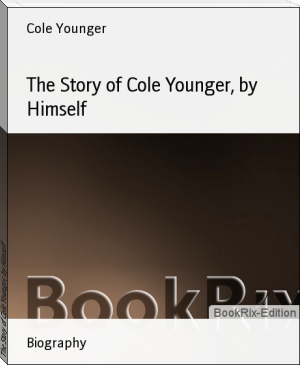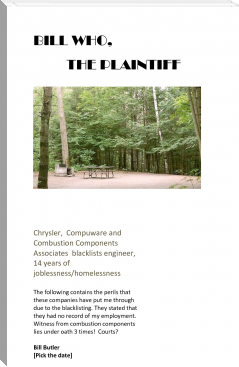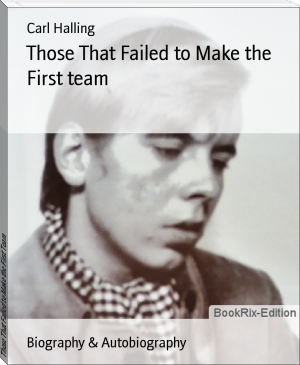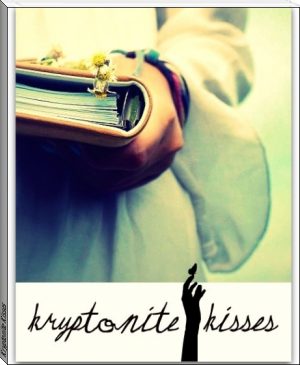The Story of Cole Younger, by Himself - Cole Younger (good novels to read in english .TXT) 📗

- Author: Cole Younger
Book online «The Story of Cole Younger, by Himself - Cole Younger (good novels to read in english .TXT) 📗». Author Cole Younger
dwelling-place. We owe the world the best there is in us for its development. Gerald Massey put it right when he said: “Toil is creation’s crown, worship is duty.”
Another important lesson life has taught me is the value, the priceless value, of good friends, and with Shakespeare I say: “Grapple them to thy soul with hooks of steel.” Some sage has said: “A man is known by the company he can not get into.” But truly this would be a barren world without the association of friends. But a man must make himself worthy of friends, for the text teaches us that “A man who wants friends must show himself friendly.” What I am today, or strive to be, I owe largely to my friends—friends to whom I fail in language to express my gratitude, which is deeper than the lips; friends who led us to believe that “stone walls do not a prison make, nor iron bars a cage;” friends who understand that human nature and sincerity are often clothed in prison garb; friends who have decreed that one false step does not lame a man for life.
Oh, what a generous doctrine! And, although unwritten, I believe God has set his seal upon it. Honest friendship is a grand religion, and if we are true to ourselves, the poet tells us, we cannot be false to any man.
However, I am forced to admit that there are many brands of friendship existing these days which had not birth in our time. For instance: A number of men have visited me in the prison, and assured me of their interest in a pardon, etc. They have talked so eloquently and earnestly that I thought I was fortunate to enlist the sympathies and aid of such splendid men. After the first or second visit I was informed as gently as possible that a price was attached to this friendship; how much would I give them for indorsing or signing a petition for a pardon? I remember how I glared at them, how my pulse almost ceased beating, at such demands. What injustice to the public to petition a man out of prison for a price! If a man can not come out of prison on his merits, let him remain there. I hold, too, that if there is honor among thieves there should be among politicians and pretentious citizens. I hate a liar and a false man. I hate a hypocrite, a man whose word to his friend is not as good as gold.
My friends, there is just one thing I will say in my own defense if you will so far indulge me. I do not believe in doing under the cover of darkness that which will not bear the light of day. During my career of outlawing I rode into town under the glare of the noonday sun, and all men knew my mission. Corporations of every color had just cause to despise me then. But no man can accuse me of prowling about at night, nor of ever having robbed an individual, or the honest poor. In our time a man’s word was equal to his oath, and seldom did a man break faith when he had once pledged himself to another.
What I say to you, fellow citizens, I say not in idle boast, but from the soul of a man who reverences truth in all its simplicity. Think of it—a price for a man’s proffered friendship. On my soul, I do not even now comprehend so monstrous a proposition, and, believe me, even the unfortunate creatures about me in prison looked more like men than your respectable citizens and professional men with a price for their friendship.
I should like to say something to the ladies who have honored me with their presence. But as I have been a bachelor all my life I scarcely know what to say. I do know, though, that they are the divine creatures of a divine Creator; I do know that they are the high priestesses of this land; and, too, I say, God could not be everywhere, so He made woman. One almost needs the lantern of a Diogenes in this progressive age to find an honest man, but not so with a good woman, who is an illumination in herself, the light of her influence shining with a radiance of its own. You will agree with me that the following lines contain more truth than poetry, and I bow to the splendid genius of the author:
Blame woman not if some appear
Too cold at times, and some too gay and light;
Some griefs gnaw deep—some woes are hard to bear.
Who knows the past, and who can judge them right?
Perhaps you have heard of banquets “for gentlemen only.” Well, it was upon one of these occasions that one of the guests was called upon to respond to a toast—“The Ladies.”
There being no ladies present, he felt safe in his remarks. “I do not believe,” he said, “that there are any real, true women living any more.” The guest opposite him sprang to his feet and shouted: “I hope that the speaker refers only to his own female relations.” I never could understand, either, when a man goes wrong it is called “misfortune,” while if a woman goes wrong it is called “shame.” But I presume, being in prison twenty-five years, I am naturally dull, and should not question a world I have not lived in for a quarter of a century. I tell you, my friends, that I know very little of women, but of one thing I am morally certain: If the front seats of Paradise are not reserved for women, I am willing to take a back seat with them. It seems to me that every man who had a mother should have a proper regard for womanhood. My own mother was a combination of all the best elements of the high character that belong to true wife and motherhood. Her devotion and friendship were as eternal as the very stars of heaven, and no misfortune could dwarf her generous impulses or curdle the milk of human kindness in her good heart. Her memory has been an altar, a guiding star, a divinity, in the darkest hour when regrets were my constant companions. It is true that I was a mere boy, in my teens, when the war was on, but there is no excuse for neglecting a good mother’s counsel, and no good can possibly result. I was taught that honor among men and charity in the errors of others were the chief duties of mankind, the fundamentals of law, both human and divine. In those two commandments I have not failed, but in other respects I fell short of my home influence, and so, my young friends, do not do as I have done, but do as I tell you to do—honor the fourth commandment.
There is no heroism in outlawry, and the fate of each outlaw in his turn should be an everlasting lesson to the young of the land. And even as Benedict Arnold, the patriot and traitor, dying in an ugly garret in a foreign land, cried with his last breath to the lone priest beside him: “Wrap my body in the American flag;” so the outlaw, from his inner soul, if not from his lips, cries out, “Oh, God, turn back the universe!”
There is another subject I want to say a word about—one which I never publicly advocated while in prison, for the reason that I feared the outside world would believe it a disguise to obtain my freedom. Freedom is the birthright heritage of every man, and it was very dear to me, but if the price of it was to pretend to be religious, the price was too high, and I would rather have remained in prison. Some men in prison fly to it as a refuge in sincerity—some otherwise. But to the sincere it is a great consolation, for it teaches men that hope is a divinity, without which no man can live and retain his reason.
But now that I have been restored to citizenship I feel free to express my views upon religion without fear that men will accuse me of hypocrisy. I do not see why that word “hypocrisy” was ever put in the English language. Now, I am a lecturer, not a minister, but I want to say that I think it is a wise plan to let the Lord have his own way with you. That’s logic. The man who walks with God is in good company. Get into partnership with Him, but don’t try to be the leading member of the firm. He knows more about the business than you do. You may be able for a time to practice deception upon your fellow men, but don’t try to fire any blank cartridges at the Author of this Universe. There are a great many ways to inspire a man with true Christian sentiment, and I must say that the least of them is sitting down and quoting a text from Scripture. Religious men and women have visited me in prison who have never mentioned religion, but have had the strongest influence over me. Their sincerity and conduct appealed to one more strongly than the bare Scripture. I can see in imagination now one whom I have so often seen in reality while in prison. She was a true, sweet, lovely, Christian young lady. I remember once asking her if all the people of her church were as good as she was. She replied, honestly and straightforwardly: “No; you will not find them all so liberal toward their unfortunate brothers, and every church has its share of hypocrites—mine the same as others. But God and the church remain just the same.” There are some don’ts I would call to your attention. One of them is, don’t try to get rich too quickly by grasping every bait thrown out to the unwary. I have been in the society of the fellows who tried to get rich quickly for the past twenty-five years, and for the most part they are a poor lot. I do not know but that I would reverse Milton’s lines so as to read:
’Tis better to sit with a fool in Paradise
Than some of those wise ones in prison.
Don’t resort to idleness. The boy who wears out the seat of his trousers holding down dry-goods boxes on the street corners will never be president of the United States. The farmer who drives to town for pleasure several days in the week will soon have his farm advertised for sale. An idle man is sure to go into the hands of a receiver. My friends, glorious opportunities are before us, with the republic’s free institutions at your command. Science and knowledge have unlocked their vaults wherein poverty and wealth are not classified—a fitting theater where the master mind shall play the leading role.
And now, with your permission, I will close with a bit of verse from Reno, the famous poet-scout. His lines are the embodiment of human nature as it should be, and to me they are a sort of creed. He says:
Another important lesson life has taught me is the value, the priceless value, of good friends, and with Shakespeare I say: “Grapple them to thy soul with hooks of steel.” Some sage has said: “A man is known by the company he can not get into.” But truly this would be a barren world without the association of friends. But a man must make himself worthy of friends, for the text teaches us that “A man who wants friends must show himself friendly.” What I am today, or strive to be, I owe largely to my friends—friends to whom I fail in language to express my gratitude, which is deeper than the lips; friends who led us to believe that “stone walls do not a prison make, nor iron bars a cage;” friends who understand that human nature and sincerity are often clothed in prison garb; friends who have decreed that one false step does not lame a man for life.
Oh, what a generous doctrine! And, although unwritten, I believe God has set his seal upon it. Honest friendship is a grand religion, and if we are true to ourselves, the poet tells us, we cannot be false to any man.
However, I am forced to admit that there are many brands of friendship existing these days which had not birth in our time. For instance: A number of men have visited me in the prison, and assured me of their interest in a pardon, etc. They have talked so eloquently and earnestly that I thought I was fortunate to enlist the sympathies and aid of such splendid men. After the first or second visit I was informed as gently as possible that a price was attached to this friendship; how much would I give them for indorsing or signing a petition for a pardon? I remember how I glared at them, how my pulse almost ceased beating, at such demands. What injustice to the public to petition a man out of prison for a price! If a man can not come out of prison on his merits, let him remain there. I hold, too, that if there is honor among thieves there should be among politicians and pretentious citizens. I hate a liar and a false man. I hate a hypocrite, a man whose word to his friend is not as good as gold.
My friends, there is just one thing I will say in my own defense if you will so far indulge me. I do not believe in doing under the cover of darkness that which will not bear the light of day. During my career of outlawing I rode into town under the glare of the noonday sun, and all men knew my mission. Corporations of every color had just cause to despise me then. But no man can accuse me of prowling about at night, nor of ever having robbed an individual, or the honest poor. In our time a man’s word was equal to his oath, and seldom did a man break faith when he had once pledged himself to another.
What I say to you, fellow citizens, I say not in idle boast, but from the soul of a man who reverences truth in all its simplicity. Think of it—a price for a man’s proffered friendship. On my soul, I do not even now comprehend so monstrous a proposition, and, believe me, even the unfortunate creatures about me in prison looked more like men than your respectable citizens and professional men with a price for their friendship.
I should like to say something to the ladies who have honored me with their presence. But as I have been a bachelor all my life I scarcely know what to say. I do know, though, that they are the divine creatures of a divine Creator; I do know that they are the high priestesses of this land; and, too, I say, God could not be everywhere, so He made woman. One almost needs the lantern of a Diogenes in this progressive age to find an honest man, but not so with a good woman, who is an illumination in herself, the light of her influence shining with a radiance of its own. You will agree with me that the following lines contain more truth than poetry, and I bow to the splendid genius of the author:
Blame woman not if some appear
Too cold at times, and some too gay and light;
Some griefs gnaw deep—some woes are hard to bear.
Who knows the past, and who can judge them right?
Perhaps you have heard of banquets “for gentlemen only.” Well, it was upon one of these occasions that one of the guests was called upon to respond to a toast—“The Ladies.”
There being no ladies present, he felt safe in his remarks. “I do not believe,” he said, “that there are any real, true women living any more.” The guest opposite him sprang to his feet and shouted: “I hope that the speaker refers only to his own female relations.” I never could understand, either, when a man goes wrong it is called “misfortune,” while if a woman goes wrong it is called “shame.” But I presume, being in prison twenty-five years, I am naturally dull, and should not question a world I have not lived in for a quarter of a century. I tell you, my friends, that I know very little of women, but of one thing I am morally certain: If the front seats of Paradise are not reserved for women, I am willing to take a back seat with them. It seems to me that every man who had a mother should have a proper regard for womanhood. My own mother was a combination of all the best elements of the high character that belong to true wife and motherhood. Her devotion and friendship were as eternal as the very stars of heaven, and no misfortune could dwarf her generous impulses or curdle the milk of human kindness in her good heart. Her memory has been an altar, a guiding star, a divinity, in the darkest hour when regrets were my constant companions. It is true that I was a mere boy, in my teens, when the war was on, but there is no excuse for neglecting a good mother’s counsel, and no good can possibly result. I was taught that honor among men and charity in the errors of others were the chief duties of mankind, the fundamentals of law, both human and divine. In those two commandments I have not failed, but in other respects I fell short of my home influence, and so, my young friends, do not do as I have done, but do as I tell you to do—honor the fourth commandment.
There is no heroism in outlawry, and the fate of each outlaw in his turn should be an everlasting lesson to the young of the land. And even as Benedict Arnold, the patriot and traitor, dying in an ugly garret in a foreign land, cried with his last breath to the lone priest beside him: “Wrap my body in the American flag;” so the outlaw, from his inner soul, if not from his lips, cries out, “Oh, God, turn back the universe!”
There is another subject I want to say a word about—one which I never publicly advocated while in prison, for the reason that I feared the outside world would believe it a disguise to obtain my freedom. Freedom is the birthright heritage of every man, and it was very dear to me, but if the price of it was to pretend to be religious, the price was too high, and I would rather have remained in prison. Some men in prison fly to it as a refuge in sincerity—some otherwise. But to the sincere it is a great consolation, for it teaches men that hope is a divinity, without which no man can live and retain his reason.
But now that I have been restored to citizenship I feel free to express my views upon religion without fear that men will accuse me of hypocrisy. I do not see why that word “hypocrisy” was ever put in the English language. Now, I am a lecturer, not a minister, but I want to say that I think it is a wise plan to let the Lord have his own way with you. That’s logic. The man who walks with God is in good company. Get into partnership with Him, but don’t try to be the leading member of the firm. He knows more about the business than you do. You may be able for a time to practice deception upon your fellow men, but don’t try to fire any blank cartridges at the Author of this Universe. There are a great many ways to inspire a man with true Christian sentiment, and I must say that the least of them is sitting down and quoting a text from Scripture. Religious men and women have visited me in prison who have never mentioned religion, but have had the strongest influence over me. Their sincerity and conduct appealed to one more strongly than the bare Scripture. I can see in imagination now one whom I have so often seen in reality while in prison. She was a true, sweet, lovely, Christian young lady. I remember once asking her if all the people of her church were as good as she was. She replied, honestly and straightforwardly: “No; you will not find them all so liberal toward their unfortunate brothers, and every church has its share of hypocrites—mine the same as others. But God and the church remain just the same.” There are some don’ts I would call to your attention. One of them is, don’t try to get rich too quickly by grasping every bait thrown out to the unwary. I have been in the society of the fellows who tried to get rich quickly for the past twenty-five years, and for the most part they are a poor lot. I do not know but that I would reverse Milton’s lines so as to read:
’Tis better to sit with a fool in Paradise
Than some of those wise ones in prison.
Don’t resort to idleness. The boy who wears out the seat of his trousers holding down dry-goods boxes on the street corners will never be president of the United States. The farmer who drives to town for pleasure several days in the week will soon have his farm advertised for sale. An idle man is sure to go into the hands of a receiver. My friends, glorious opportunities are before us, with the republic’s free institutions at your command. Science and knowledge have unlocked their vaults wherein poverty and wealth are not classified—a fitting theater where the master mind shall play the leading role.
And now, with your permission, I will close with a bit of verse from Reno, the famous poet-scout. His lines are the embodiment of human nature as it should be, and to me they are a sort of creed. He says:
Free e-book «The Story of Cole Younger, by Himself - Cole Younger (good novels to read in english .TXT) 📗» - read online now
Similar e-books:





Comments (0)